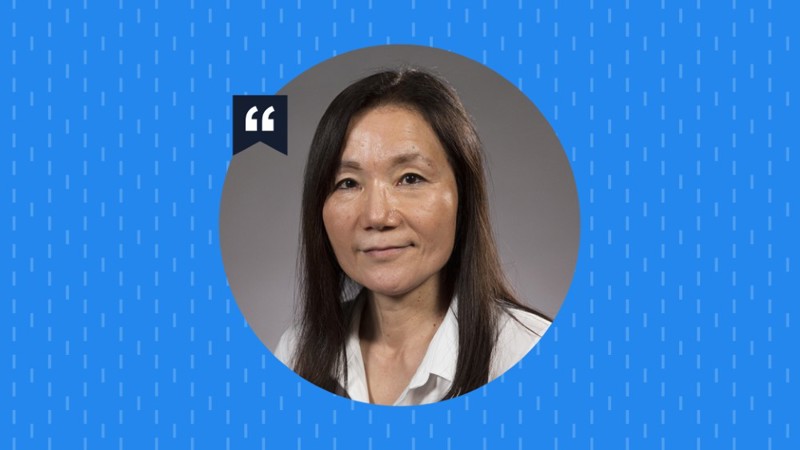After relocating from Japan to Australia with her family more than 27 years ago, Naoko Nakao, a Japanese Translator at WiseTech Global, decided to embark on her own career journey and build a life in a new country.
In celebration of International Women’s Day (IWD), we sat down with Naoko to find out how she built a career in Australia, the importance of challenging gender inequalities in the workplace, and what this year’s IWD theme, ‘break the bias’ means to her.
Can you share a bit about your career journey?
My career started when I moved to Australia in 1994 as a freelance Japanese translator. I got a job with Toyota and I worked there for 17 and a 1/2 years as an executive assistant for Japanese executives, and then later I became a manager in the parts and accessories pricing department.
Most recently I worked for Sydney BridgeClimb as a Japanese interpreter, but unfortunately, because of COVID there weren’t as many Japanese tourists visiting Australia. I was then contacted on LinkedIn by one of the talent acquisition specialists at WiseTech and asked if I would be interested in working for a tech company, and that’s how I ended up working at WiseTech Global.
What has your experience working for a tech company been like?
At first I thought it would be quite difficult because it was so different to anywhere I’d worked before, but I’ve actually really enjoyed it. WiseTech specializes in logistics software and there are so many things to learn, so it’s very interesting and the people are really nice and approachable.
One of the biggest differences between Japanese companies and a company like WiseTech is that we have a flat structure here and we practice our mantra “anyone can speak to anyone at any time”. So, if I want to speak to our CEO Richard, I can. That’s not the case when working for a Japanese company, and if you approached the CEO, it would be frowned upon because it’s very hierarchical. The flat structure and open communication are things I really like about working at WiseTech.
What’s an achievement, either at work or outside of work, that you’re proud of?
There's one thing I'm very proud of which I achieved during my time with Toyota. The company used to send a male running squad of eight runners to a global sporting event in Japan. Many women at the company were frustrated because there were so many amazing runners and they weren’t able to participate in this event.
I initiated a campaign to send a female running squad to the event by sending out a company-wide survey. The survey results were phenomenal, and they actually moved the company to change their policy to send both male and female squads to Japan. From then on, a female squad was sent to Japan every year to compete.
Even though I was working for Toyota in Australia, it’s headquartered in Japan so this was a huge cultural change for the company, and one that the female employees all really appreciated. I was really proud to have played a part in bridging the gender gap and creating a shift in the company’s culture.
What does International Women’s Day mean to you?
It’s a celebration of women's advancement and achievement in society, including the opportunity for equal pay and employment.
Growing up in Japan, there were many cultural differences as women didn’t really share their voice or have as many freedoms as we do in Australia. But I grew up with brothers and was a bit of a tomboy, so I was a bit naïve to the cultural norms expected of me as a woman. I never really thought there was anything I couldn’t do, and I always had the belief that I can achieve anything.
What does this year’s International Women’s Day theme ‘break the bias’ mean to you?
The first thing that comes to mind is the Napoleon quote, “Impossible is a word to be found only in the dictionary of fools. Wise people create opportunities for themselves and make everything possible.”
Shortly after moving to Australia with my family more than two decades ago, my then husband and I separated, and I was determined to become financially independent. I worked on building my own career here, and even though I was starting from scratch I knew it was something I could achieve.
I started working as a translator and I eventually bought a house. Even my children were amazed that I could achieve this on my own. I became an Australian citizen in 2011 and am really proud of the life I’ve built here.
I’m now a grandma with four grandchildren and have been playing soccer for 26 years. I couldn’t resist playing soccer myself when I would watch my kids playing soccer. So back in 1995 I went to a club soccer registration and asked if there was a team I could join (I was in my late thirties at this time). They bluntly said ‘no’ so I went to another soccer club’s registration desk which happened to be in the same shopping centre. They didn’t have a ladies’ team, but they said, “why not? that’s a great idea!”, and all ladies at the registration desk said they were interested and would join. This is how the ladies teams started with the Belrose Terrey Hills Soccer Club, 26 years ago.
So to me, ‘break the bias’ means being innovative, thinking outside the box, and having the courage to achieve everything we want in life.
